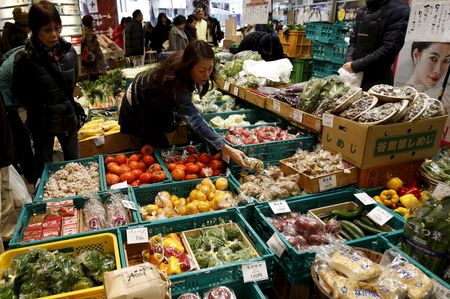 1
1 1
1

By Jamie McGeever
(Reuters) – A look at the day ahead in Asian markets from Jamie McGeever.
Japanese inflation grabs the spotlight in Asia on Friday, with investors looking for clues on what the Bank of Japan (BOJ) might do at its next policy meeting after surprising markets this week by standing pat on policy.
Consumer price inflation data from Malaysia and Hong Kong, and producer price figures from South Korea, will also be released on Friday, while the People’s Bank of China announces its latest lending rate decision.
Japanese consumer price inflation is expected to have hit a new 41-year high of 4.0% in December, up from 3.70%. The figures come three days after the BOJ surprised markets by making no changes to its ‘yield curve control’ policy.
This will mark the ninth straight month of inflation above the BOJ’s 2% target. Despite the BOJ’s ‘no show’ this week, it is likely to act again soon, maybe before, if not certainly after uber-dove Governor Haruhiko Kuroda’s term ends in April.
BOJ officials, including Kuroda, are increasingly concerned with rising wage cost pressures. Policymakers will also be keeping a close eye on China’s economic revival, presuming there is one following Beijing’s exit from its zero-COVID stance.
However, as the hard data and deeply inverted yield curves clearly show, global inflationary forces are dissipating. On top of that, the Japanese yen has rallied almost 20% from its historic low in October, and a host of commodity, energy and food prices are negative year-on-year.
Risk appetite in Japan is holding up well, with the Nikkei 225 on course for its best week since November. Indeed, risk appetite across the continent is holding up remarkably well.
The pace of gains is slowing but Asian stocks are up 8% this year, with only three down days this year and two down weeks in the last 12. The outperformance is impressive – the S&P 500 is up 2% this year, world stocks are up 4% and stocks in the seemingly recession-skirting euro zone are up just 6%.
Meanwhile, China is expected to keep benchmark lending rates unchanged for a fifth month on Friday, although analysts think cuts next month are probable after the central bank pledged steps to boost a COVID-ravaged economy.
Three key developments that could provide more direction to markets on Friday:
– Japan inflation (December)
– China lending rate decision
– ECB President Christine Lagarde speaks in Davos
(Reporting by Jamie McGeever in Orlando, Fla.; Editing by Josie Kao)